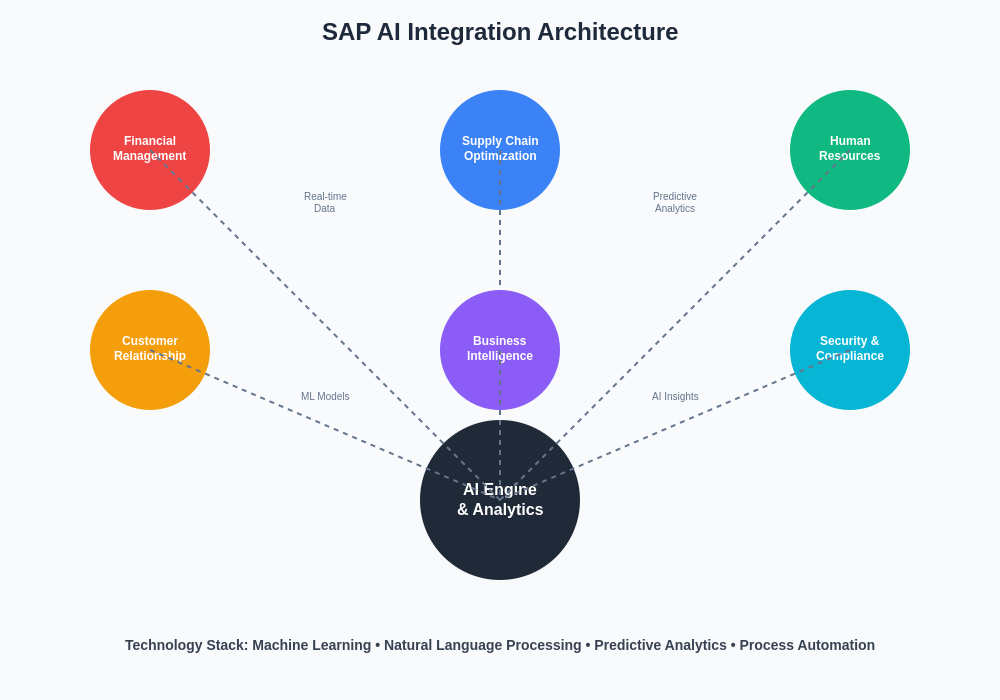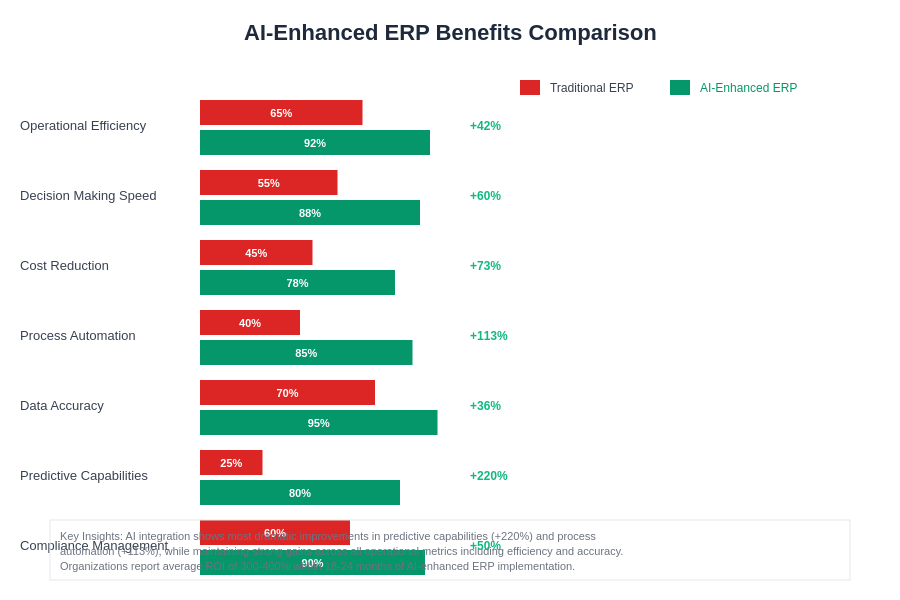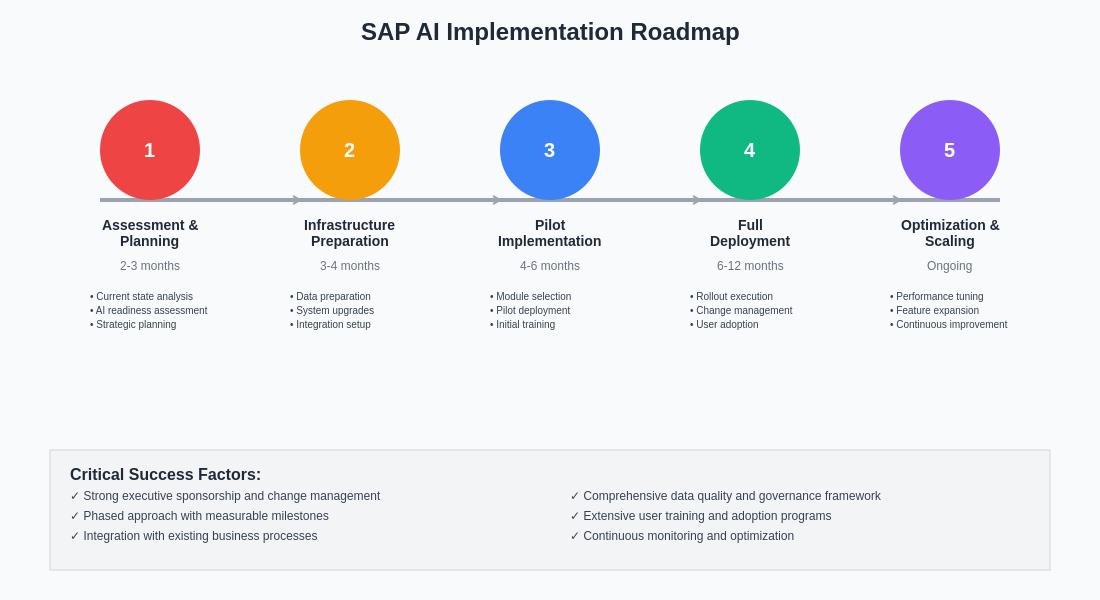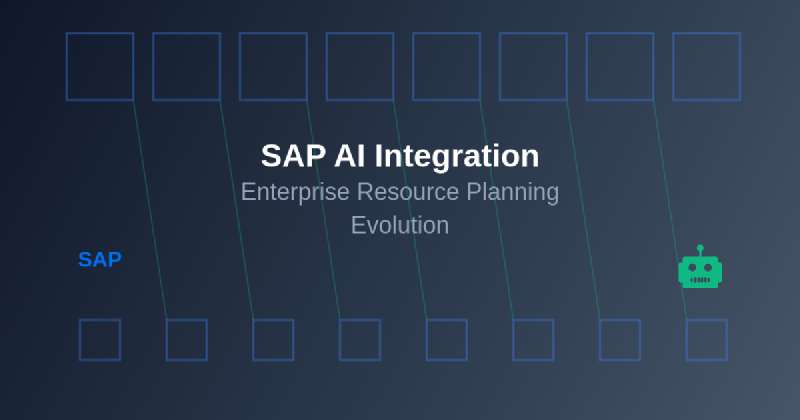The enterprise technology landscape has undergone a profound transformation with the integration of artificial intelligence into SAP’s comprehensive suite of enterprise resource planning solutions. This revolutionary advancement represents more than just technological enhancement; it signifies a fundamental shift in how organizations manage their resources, optimize operations, and drive strategic decision-making through intelligent automation and predictive analytics. The convergence of SAP’s robust ERP infrastructure with cutting-edge AI capabilities has created unprecedented opportunities for businesses to achieve operational excellence while maintaining the flexibility and scalability required in today’s dynamic marketplace.
Explore the latest AI trends revolutionizing enterprise technology to understand how artificial intelligence is reshaping business operations across industries. The integration of AI into SAP systems represents a paradigmatic evolution that extends far beyond simple process automation, encompassing intelligent data analysis, predictive modeling, and autonomous decision-making capabilities that empower organizations to operate with unprecedented efficiency and strategic insight.
The Foundation of Intelligent Enterprise Systems
The transformation of traditional ERP systems through AI integration has established a new paradigm for enterprise resource management that transcends conventional operational boundaries. SAP’s commitment to embedding artificial intelligence throughout its ecosystem has resulted in systems that not only manage resources but actively contribute to strategic planning and operational optimization through continuous learning and adaptation. This intelligent foundation enables organizations to move beyond reactive management approaches toward proactive, data-driven strategies that anticipate market changes and operational challenges before they impact business performance.
The architectural evolution within SAP systems reflects a comprehensive reimagining of how enterprise data flows, processes, and generates actionable insights. Traditional ERP implementations focused primarily on transaction processing and data storage, while AI-enhanced SAP solutions actively analyze patterns, predict outcomes, and recommend optimal strategies across all business functions. This transformation has created enterprise systems that serve as strategic partners rather than mere operational tools, fundamentally altering the relationship between technology infrastructure and business strategy.
Revolutionary Process Automation and Optimization
The integration of artificial intelligence into SAP’s enterprise resource planning framework has revolutionized process automation by introducing intelligent decision-making capabilities that extend far beyond rule-based workflows. Modern SAP AI implementations leverage machine learning algorithms to continuously analyze business processes, identify optimization opportunities, and automatically implement improvements without requiring manual intervention. This level of intelligent automation has transformed everything from procurement and supply chain management to financial reporting and human resource administration.
The sophistication of AI-driven process optimization within SAP environments enables organizations to achieve levels of operational efficiency previously unattainable through traditional automation methods. These systems can dynamically adjust workflows based on real-time conditions, predict resource requirements with remarkable accuracy, and optimize resource allocation across complex organizational structures. The result is a self-improving enterprise ecosystem that becomes more efficient and effective over time through continuous learning and adaptation.
Harness the power of advanced AI with Claude to enhance your enterprise planning strategies with sophisticated reasoning and analytical capabilities. The combination of SAP’s enterprise expertise with AI-powered insights creates a powerful foundation for strategic decision-making that can transform organizational performance across all operational dimensions.
Predictive Analytics and Strategic Decision Support
The incorporation of predictive analytics capabilities into SAP’s AI-integrated platform has fundamentally transformed how organizations approach strategic planning and risk management. These advanced analytical tools leverage historical data patterns, market trends, and operational metrics to generate highly accurate forecasts that inform critical business decisions. The predictive capabilities extend across all aspects of enterprise operations, from demand forecasting and inventory optimization to financial planning and resource allocation strategies.
The strategic value of AI-powered predictive analytics within SAP environments lies not merely in their ability to forecast future conditions but in their capacity to recommend optimal strategies for various scenarios. These systems can model multiple potential outcomes, evaluate risk factors, and suggest actionable strategies that maximize opportunities while minimizing potential negative impacts. This level of strategic insight enables organizations to make informed decisions with confidence, even in uncertain market conditions.
Intelligent Financial Management and Compliance
Financial management within AI-enhanced SAP systems has evolved to incorporate sophisticated automation capabilities that streamline complex accounting processes while ensuring comprehensive compliance with regulatory requirements. These intelligent systems can automatically categorize transactions, detect anomalies, and generate detailed financial reports with minimal human intervention. The integration of machine learning algorithms enables continuous improvement in accuracy and efficiency, while built-in compliance monitoring ensures adherence to evolving regulatory standards.
The transformation of financial processes through AI integration extends beyond simple automation to include intelligent analysis and strategic recommendations. Modern SAP financial modules can identify cost-saving opportunities, optimize cash flow management, and provide detailed insights into financial performance trends that inform strategic planning decisions. This comprehensive approach to financial management has enabled organizations to achieve greater transparency, accuracy, and strategic control over their financial operations.
Supply Chain Intelligence and Optimization
The application of artificial intelligence to supply chain management within SAP environments has created unprecedented opportunities for optimization and risk mitigation across complex global networks. AI-powered supply chain systems can analyze vast amounts of data from multiple sources, including supplier performance metrics, market conditions, transportation logistics, and demand patterns, to optimize procurement strategies and inventory management decisions. This intelligent approach to supply chain management has resulted in significant cost reductions, improved delivery performance, and enhanced supplier relationship management.
The sophistication of AI-driven supply chain optimization extends to predictive maintenance, quality assurance, and risk management capabilities that help organizations maintain operational continuity while minimizing costs and maximizing efficiency. These systems can predict potential disruptions, recommend alternative suppliers, and automatically adjust procurement strategies based on changing market conditions. The result is a more resilient and responsive supply chain that can adapt to challenges while maintaining optimal performance levels.

The comprehensive architecture of AI-integrated SAP systems demonstrates the sophisticated interconnection of various business modules with artificial intelligence capabilities. This integrated approach ensures that AI enhancements benefit all aspects of enterprise operations while maintaining data consistency and operational coherence across the entire organizational ecosystem.
Human Resource Management and Talent Optimization
The evolution of human resource management through SAP AI integration has transformed traditional personnel administration into strategic talent optimization that drives organizational performance and employee satisfaction. Intelligent HR systems can analyze employee performance patterns, predict retention risks, and recommend personalized development strategies that align individual growth with organizational objectives. These capabilities have revolutionized talent management by enabling data-driven decisions that optimize workforce productivity while enhancing employee engagement and satisfaction.
The sophistication of AI-powered HR analytics extends to recruitment optimization, performance evaluation, and succession planning capabilities that help organizations build and maintain high-performing teams. These systems can identify the characteristics of successful employees, predict future talent needs, and recommend strategies for developing internal capabilities. The integration of natural language processing enables more sophisticated analysis of employee feedback and communication patterns, providing insights that inform organizational culture and management strategies.
Leverage advanced AI research capabilities with Perplexity to stay informed about emerging trends in enterprise AI integration and human resource optimization. The continuous evolution of AI capabilities creates new opportunities for organizations to enhance their talent management strategies and build more effective, engaged, and productive workforces.
Customer Relationship Management and Experience Enhancement
The integration of artificial intelligence into SAP’s customer relationship management capabilities has created sophisticated systems that enhance customer experiences while optimizing sales and marketing strategies. AI-powered CRM systems can analyze customer behavior patterns, predict purchasing preferences, and recommend personalized engagement strategies that improve customer satisfaction and loyalty. These capabilities have transformed customer relationship management from reactive service provision to proactive experience optimization that drives revenue growth and competitive advantage.
The advanced analytics capabilities within AI-enhanced SAP CRM systems enable organizations to segment customers more effectively, personalize marketing communications, and optimize pricing strategies based on detailed behavioral analysis. Machine learning algorithms continuously refine customer profiles and preferences, enabling increasingly sophisticated personalization that enhances customer experiences while maximizing revenue opportunities. This intelligent approach to customer relationship management has proven essential for organizations operating in competitive markets where customer experience differentiation is crucial for success.
Data Integration and Business Intelligence Evolution
The transformation of business intelligence capabilities through SAP AI integration has created comprehensive analytical platforms that provide unprecedented insights into organizational performance and market opportunities. These intelligent systems can integrate data from multiple sources, identify patterns and trends that might not be apparent through traditional analysis, and generate actionable recommendations that inform strategic decision-making. The evolution of business intelligence within SAP environments reflects a shift from historical reporting to predictive and prescriptive analytics that drive proactive business strategies.
The sophistication of AI-powered business intelligence extends to real-time analytics capabilities that enable organizations to respond quickly to changing conditions and opportunities. These systems can monitor key performance indicators continuously, detect anomalies or trends that require attention, and automatically generate alerts and recommendations for appropriate responses. This level of intelligent monitoring and analysis has enabled organizations to maintain competitive advantages through rapid adaptation and strategic responsiveness.

The quantitative benefits of AI-enhanced ERP systems demonstrate substantial improvements across critical business metrics including operational efficiency, cost reduction, decision-making speed, and strategic planning accuracy. Organizations implementing AI-integrated SAP solutions consistently report significant performance improvements that justify investment costs while providing sustainable competitive advantages.
Security Enhancement and Risk Management
The integration of artificial intelligence into SAP security frameworks has created sophisticated protection systems that can identify and respond to threats more effectively than traditional security measures. AI-powered security systems continuously monitor system access patterns, transaction behaviors, and data usage to detect anomalies that might indicate security breaches or unauthorized activities. These intelligent security capabilities provide organizations with enhanced protection while maintaining operational efficiency and user accessibility.
The evolution of risk management through AI integration extends beyond cybersecurity to include operational risk assessment, compliance monitoring, and strategic risk evaluation. Intelligent risk management systems can analyze multiple risk factors simultaneously, predict potential impacts, and recommend mitigation strategies that protect organizational assets while enabling continued growth and innovation. This comprehensive approach to risk management has become essential for organizations operating in increasingly complex and regulated business environments.
Implementation Strategies and Change Management
The successful implementation of AI-integrated SAP solutions requires comprehensive change management strategies that address both technological and organizational transformation requirements. Organizations must consider not only the technical aspects of system integration but also the cultural and process changes required to maximize the benefits of AI enhancement. This holistic approach to implementation ensures that organizations can realize the full potential of AI-integrated ERP systems while maintaining operational continuity during the transition process.
The complexity of AI integration projects requires careful planning, stakeholder engagement, and phased implementation approaches that minimize disruption while maximizing adoption rates. Successful implementations typically involve extensive training programs, process redesign initiatives, and ongoing support systems that help employees adapt to new AI-enhanced workflows and capabilities. The investment in change management and training typically results in faster adoption rates and greater realization of expected benefits from AI integration initiatives.
Industry-Specific Applications and Customization
The versatility of SAP AI integration enables customization for industry-specific requirements and operational challenges that vary across different business sectors. Manufacturing organizations can leverage AI capabilities for predictive maintenance, quality control, and production optimization, while service industries can focus on customer experience enhancement and resource optimization. This flexibility enables organizations to tailor AI capabilities to their specific operational requirements and competitive strategies.
The sophistication of industry-specific AI applications continues to evolve as organizations identify unique opportunities to leverage artificial intelligence for competitive advantage. Healthcare organizations can utilize AI for patient care optimization and regulatory compliance, while financial services firms can focus on risk management and fraud detection capabilities. This industry-specific customization ensures that AI integration delivers maximum value for each organization’s unique operational context and strategic objectives.

The structured approach to SAP AI implementation demonstrates the critical phases and considerations required for successful integration. This roadmap provides organizations with a framework for planning and executing AI integration projects while managing risks and maximizing the probability of achieving desired outcomes and return on investment.
Future Developments and Strategic Implications
The continued evolution of AI capabilities within SAP environments promises even more sophisticated applications that will further transform enterprise resource planning and business operations. Emerging technologies such as advanced natural language processing, computer vision, and autonomous decision-making will create new opportunities for process optimization and strategic insight generation. Organizations that establish strong foundations in AI-integrated ERP systems will be well-positioned to capitalize on these future developments and maintain competitive advantages in evolving markets.
The strategic implications of AI integration extend beyond operational efficiency improvements to include fundamental changes in business models and competitive strategies. Organizations with advanced AI capabilities will be able to offer new services, enter new markets, and create value propositions that were previously impossible with traditional ERP systems. This transformation represents a significant opportunity for organizations willing to invest in comprehensive AI integration and the organizational changes required to maximize its potential.
The convergence of artificial intelligence with enterprise resource planning through SAP integration represents one of the most significant technological transformations in modern business history. Organizations that successfully implement and leverage these capabilities will achieve sustainable competitive advantages while those that delay adoption risk falling behind in increasingly competitive and technology-driven markets. The future belongs to organizations that can effectively combine human expertise with artificial intelligence to create intelligent enterprises capable of thriving in complex and rapidly changing business environments.
Disclaimer
This article is for informational purposes only and does not constitute professional advice. The views expressed are based on current understanding of SAP AI integration technologies and their applications in enterprise environments. Organizations should conduct thorough evaluations and consult with qualified professionals when planning AI integration projects. The effectiveness and suitability of AI-enhanced ERP solutions may vary depending on specific organizational requirements, existing infrastructure, and implementation approaches.
